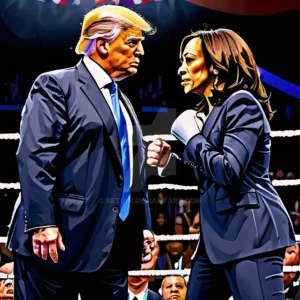Bitcoin has emerged as a prominent actor in the financial world, symbolizing financial independence and technological innovation, as the world of finance evolves with the rise of digital currencies. In contrast, Donald Trump, the 45th President of the United States, has forever altered the political landscape with his unconventional leadership style.
The relationship between Bitcoin and Trump is intricate, reflecting the broader tensions between conventional power structures and emergent technologies. This article investigates the impact of Trump’s stance on Bitcoin on the discussion surrounding cryptocurrencies and the implications for the future of digital assets in a politically fraught environment.
Trump’s Doubts Regarding Bitcoin Donald Trump has not hesitated to articulate his skepticism regarding Bitcoin and cryptocurrencies. While still in office, Trump tweeted in July 2019, “I am not a fan of Bitcoin and other Cryptocurrencies, which are not money and whose value is highly volatile and based on thin air.”
Further, he criticized the unregulated nature of digital currencies, associating them with illicit activities such as money laundering and drug trafficking. Trump’s remarks underscored his apprehension regarding the potential for cryptocurrencies to undermine the U.S. dollar’s status as the world’s primary reserve currency and his preference for maintaining its dominance.
His critical posture on cryptocurrencies was mirrored by Trump’s administration. The potential hazards associated with digital currencies were also expressed by key figures in his administration, including Treasury Secretary Steven Mnuchin. Mnuchin underscored the necessity of rigorous regulation to prevent Bitcoin from being utilized for illicit purposes, which is indicative of the administration’s comprehensive strategic approach to national security and financial regulation.
The Influence of Trump’s Opinions on Bitcoin Regulation
The regulatory landscape in the United States was influenced by Trump’s stance on Bitcoin and cryptocurrencies. The broader debate regarding the management of digital assets was influenced by the administration’s emphasis on stringent regulation. Although the Trump administration did not impose comprehensive regulations on Bitcoin, it did establish the foundation for a more cautious and measured approach to the cryptocurrency industry.
The cryptocurrency market was the subject of increased scrutiny by U.S. regulatory agencies, such as the Securities and Exchange Commission (SEC) and the Financial Crimes Enforcement Network (FinCEN), during Trump’s presidency. Since then, these agencies have intensified their examination of digital assets, with a particular emphasis on consumer protection, anti-money laundering (AML) compliance, and securities classification.
Although Trump’s direct influence on specific regulatory actions may be restricted, his administration’s overall cautious stance on cryptocurrencies contributed to the establishment of the tone for future regulatory developments.
Bitcoin as a Symbol of Financial Autonomy
Bitcoin’s popularity persisted, particularly among those who regard it as a safeguard against economic instability and government control, despite Trump’s skepticism. For numerous individuals, Bitcoin symbolizes financial autonomy—a method of safeguarding wealth that is not dependent on conventional financial systems, which are frequently subject to government intervention and inflationary pressures. This appeal resonates with a portion of Trump’s constituency, particularly those who harbor skepticism toward the federal government and the central banking system.
The ethos of individualism and self-reliance, which have been fundamental to Trump’s political messaging, is in alignment with the decentralized nature of Bitcoin. Although Trump may not personally endorse Bitcoin, it has gained popularity among a portion of his supporters who regard it as a means of safeguarding personal freedom in an era of escalating uncertainty.
The Prospects of Bitcoin in a Politically Divided United States
The future of Bitcoin continues to be a topic of intense debate as the United States advances in a politically divided environment. On the one hand, there is an increasing institutional interest in Bitcoin, as significant financial institutions and public companies are investing in the digital currency.
Conversely, political figures such as Trump persist in their apprehension regarding the potential hazards associated with unregulated cryptocurrencies. The trajectory of Bitcoin and other digital assets will unquestionably be influenced by the political landscape in the United States. The role of Bitcoin as a disruptive force in the financial system will be influenced by both its advocates and its detractors as discussions regarding regulation, taxation, and monetary policy continue.
Bitcoin and Its Place in the Financial System at Large
Even though many in politics are skeptical about Bitcoin, its place in the financial system has grown. Bitcoin, the first and most famous cryptocurrency, has opened the door for many other digital assets and blockchain technologies to be developed. Its impact goes well beyond that of a simple digital currency; it has ignited revolutionary change in domains like blockchain-based smart contracts, decentralized finance (DeFi), and non-fungible tokens (NFTs). No matter where you stand politically, Bitcoin will continue to have an influence since more and more of the financial sector is embracing these technologies.
Bitcoin and Its Effects on Conventional Banks
As Bitcoin and other cryptocurrencies have grown in popularity, conventional banks have had to change with the times. Investment firms and banks are looking at methods to incorporate digital assets into their services, such as custody solutions, investment products, and cryptocurrency trading.
The increasing acceptance of cryptocurrencies as a valid asset class and the rising demand for digital assets among consumers are the primary factors propelling this change. More and more established financial institutions are buying cryptocurrency, which may change the way regulators look at the technology and lead to a more complex understanding of digital assets.
Bitcoin and International Relations
There are ramifications for international relations caused by Bitcoin’s rise to prominence as a worldwide financial phenomenon. The worldwide landscape of digital assets is being shaped by countries with varying opinions on the regulation and use of cryptocurrencies. Countries that get on board with blockchain and Bitcoin could end up ahead of the competition, which would be great for innovation and investment.
On the flip side, the digital economy is changing at a rapid pace, making it difficult for nations with restrictive regulations to stay competitive. The worldwide role of Bitcoin will be greatly influenced by the interaction between national policies and developments in cryptocurrencies throughout the world.
Changes in Politics and Regulation to Come
Political and legislative shifts will continue to impact Bitcoin’s trajectory. The position on cryptocurrencies might change when new governments are installed and regulatory systems undergo changes. Concerns concerning security, fraud, and market stability must be considered with the possible advantages of digital assets, such as technical innovation and financial inclusion, by policymakers and regulators. The regulatory climate for Bitcoin and its acceptance into the mainstream monetary system are both affected by the results of these discussions.
How People View Things Over Time
Bitcoin and other cryptocurrencies are constantly changing in the eyes of the public. The narrative surrounding cryptocurrencies is changing as digital assets gain more public support and are incorporated into ordinary financial activity.
Future political and regulatory attitudes may be impacted by the growing acceptance and comprehension of Bitcoin’s technology and its possible uses. How the general public views Bitcoin in the future will determine how widely used it is and where it goes from here in the political and financial spheres.




